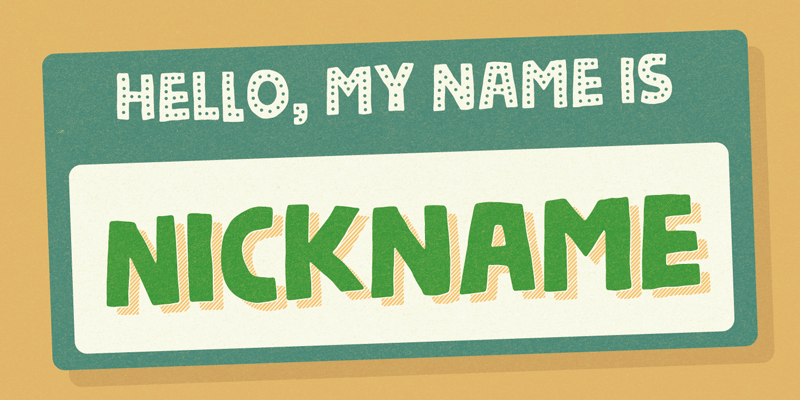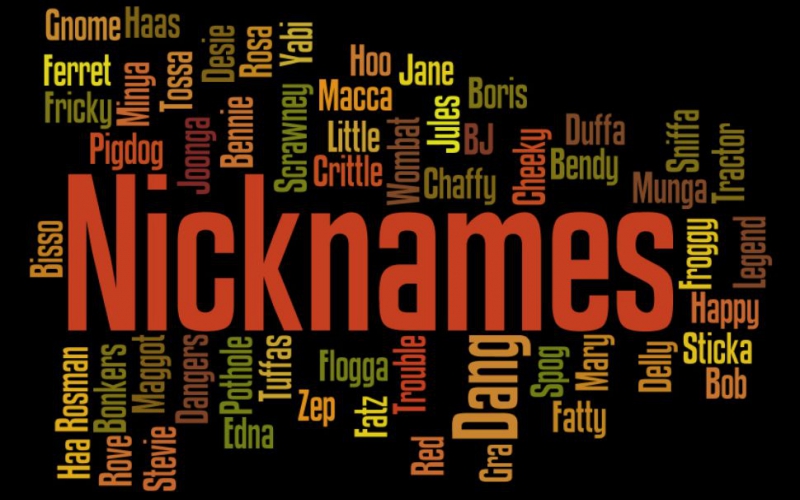Understanding Sobriquet and its Usage

A sobriquet, often referred to as a nickname, is a secondary name or epithet given to a person, place, or thing. It can be a playful or affectionate term, a descriptive label, or even a derogatory one. The term “sobriquet” originates from the French word “sobrequet,” which itself comes from the Old French word “sobrequet,” meaning “surcoat,” a type of outer garment.
Etymology and Origin
The term “sobriquet” has its roots in the French language and has evolved over time. The word “sobrequet” is derived from the Old French word “sobrequet,” meaning “surcoat,” a type of outer garment worn over armor. The connection between a surcoat and a nickname is unclear, but it’s believed that the term might have been used to refer to a distinguishing feature or a name that identified a person.
Historical and Cultural Contexts
Sobriquets have been used throughout history and across cultures, often reflecting social, political, or cultural trends. In ancient Rome, individuals were given cognomen, which were often descriptive nicknames that reflected their personality, physical attributes, or achievements. For instance, Julius Caesar was known as “Caesar,” which is believed to have originated from the Latin word “caesaries,” meaning “hairy” or “long-haired.”
During the Middle Ages, sobriquets were frequently used to identify individuals who might not have had a formal surname. These nicknames often reflected a person’s occupation, physical appearance, or personality traits. For example, William Shakespeare was known as “The Bard of Avon” because of his birthplace and his prolific writing.
In the Renaissance, sobriquets became more prevalent as a way to distinguish individuals from others who shared the same name. The Italian Renaissance artist Michelangelo was known as “Michelangelo Buonarroti” but was also called “Il Divino” (The Divine) due to his exceptional talent and skill.
Examples of Famous Individuals and their Sobriquets
- William Shakespeare: “The Bard of Avon” – This sobriquet reflects Shakespeare’s birthplace and his prolific writing.
- Napoleon Bonaparte: “The Little Corporal” – This nickname was given to Napoleon during his early military career because of his short stature and his leadership qualities.
- Winston Churchill: “The Bulldog” – This sobriquet was given to Churchill during World War II because of his determination and resilience in the face of adversity.
- Marilyn Monroe: “The Blonde Bombshell” – This nickname reflects Monroe’s iconic blonde hair and her captivating persona.
Exploring Synonyms for Sobriquet: Sobriquet Synonym

Sobriquet synonym – While “sobriquet” itself is a charming and elegant word, sometimes a different synonym might be more suitable depending on the context and the desired effect. Exploring these synonyms reveals the nuances of language and the subtle differences in their connotations.
Synonyms for Sobriquet, Sobriquet synonym
Here’s a table showcasing some common synonyms for “sobriquet,” along with their definitions, usage examples, and connotations:
| Synonym | Definition | Usage Examples | Connotation |
|---|---|---|---|
| Nickname | A familiar name given to a person, place, or thing, often used in place of the real name. | “My nickname is ‘Shorty’ because I’m the shortest in my family.” | Informal, neutral |
| Alias | A false name used by someone, often for a criminal or illegal purpose. | “The thief used an alias to avoid detection.” | Formal, negative |
| Moniker | A name or title, especially one that is well-known or distinctive. | “The city is known by the moniker ‘The Windy City’.” | Formal, neutral |
| Epithet | A descriptive phrase or name that is frequently used to characterize a person or thing. | “The king was known by the epithet ‘the Great’.” | Formal, positive |
| Byname | A secondary or familiar name, often used in addition to a person’s real name. | “The artist was known by the byname ‘The Master’.” | Formal, neutral |
| Handle | A name used online or in a particular context, especially in online forums or gaming. | “My online handle is ‘GamerGirl99’.” | Informal, neutral |
The choice of synonym depends on the specific context and the desired effect. For instance, “nickname” is the most common and informal synonym, suitable for everyday use. “Alias” carries a negative connotation, often associated with secrecy or deception. “Moniker” is a more formal synonym, often used to describe a name that is well-known or distinctive. “Epithet” is a formal and often positive synonym, used to describe a name that reflects a person’s qualities or achievements. “Byname” is a more formal synonym, often used in historical contexts. “Handle” is an informal synonym, typically used in online contexts.
The Art of Choosing a Sobriquet

A sobriquet, a nickname, is a powerful tool for personal branding, storytelling, and even historical recognition. Crafting an effective sobriquet involves more than just a catchy phrase; it’s about understanding the context, audience, and desired impact.
Factors to Consider When Choosing a Sobriquet
Choosing a sobriquet involves careful consideration of several factors. These factors influence the effectiveness and memorability of the sobriquet.
- Context: The context in which the sobriquet will be used is crucial. For instance, a playful sobriquet might be appropriate among friends, but a more formal one would be better suited for a professional setting.
- Audience: Understanding the audience is essential. A sobriquet that resonates with a specific group might not be well-received by another. For example, a sobriquet referencing a popular cultural phenomenon would be more relevant to a younger audience.
- Desired Impact: The desired impact of the sobriquet should be considered. Do you want to be seen as humorous, authoritative, or inspiring? The sobriquet should reflect the desired persona.
Crafting an Effective Sobriquet
Crafting an effective sobriquet involves a combination of creativity, relevance, and memorability.
- Relevance: The sobriquet should be relevant to the individual or the context. It could be based on a personal characteristic, a skill, or a notable achievement.
- Memorable: A memorable sobriquet is easy to remember and recall. It can be achieved through a catchy phrase, a unique wordplay, or a memorable association.
- Uniqueness: A unique sobriquet helps stand out from the crowd. It should be distinctive and avoid common or generic terms.
Examples of Creative and Memorable Sobriquets
- “The Bard” – This sobriquet is often associated with William Shakespeare, highlighting his mastery of language and storytelling.
- “Iron Man” – This sobriquet, originally associated with a comic book character, has become synonymous with resilience and determination.
- “The Queen of Soul” – This sobriquet, given to Aretha Franklin, emphasizes her powerful vocals and her influence on soul music.
